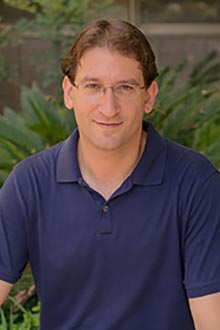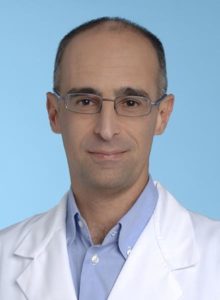Research to Advance Neuroendocrine Tumor Treatment
The Neuroendocrine Tumor Research Foundation (NETRF) today announced $3.5 million in neuroendocrine tumor (NET) research grants to fund 12 projects around the world in pursuit of more precise treatments for this uncommon cancer affecting an estimated 171,000 Americans.
After investing $26 million in research during the past 15 years, NETRF has helped to establish the NET knowledge base needed to expand the exploration of improved treatments, according to Elyse Gellerman, NETRF Chief Executive Officer. “We can see real momentum in this new round of grants. We hope the discoveries from these projects will lead to improved treatment options for patients.”
NETRF is supporting a new pioneering approach to NET immunotherapy with a Petersen Accelerator Award to Steven Libutti, MD, Rutgers Cancer Institute of New Jersey, to characterize a novel immune regulator called B7x to determine whether it has a role in shutting off the body’s immune response to fight against pancreatic NETs.
This round of funding features multiple new fronts for NETRF. To help grow the NET scientific workforce, the Foundation granted two inaugural Mentored Awards for early career researchers, one of which was funded by a grant from Ipsen. There were also new areas of NET inquiry. For the first time, NETRF is funding pheochromocytoma and paraganglioma research, including an evaluation of a novel radiotracer for imaging adrenal NETs.
NETRF also funded four research projects in lung NETs, an area that has not previously received the attention of other NET sites. These lung studies include:
- Conducting single-cell genomic analyses to understand how lung NETs form, grow, and spread.
- Mapping the cellular networks of typical and atypical lung NETs to find biomarkers that help predict a tumor’s aggressiveness.
- Characterizing the molecular makeup of a newly identified, aggressive lung NET called “supra-carcinoid.”
- Determining the sociodemographic and geographic patterns of lung NETs in California.
“Advances in NET research have been hampered by the lack of effective laboratory disease models, and a limited understanding of the molecular and genetic profiles of NETs,” said John Kanki, PhD, NETRF Director of Research. “Now that we are making strong headway along these lines, we can finally begin to drill deeper with greater specificity, to identify and explore new strategies for treating NETs.”
NET tumors require the expansion of new blood vessels in order to grow and spread and two new grants explore new therapies that target developing tumor blood vessels. Researchers at Vanderbilt University will explore the potential efficacy of a combination therapy testing a drug known to affect the formation of new blood vessels (cabozantinib) together with an experimental drug called CB-839. At Columbia University Medical School, scientists will conduct preclinical laboratory experiments to test whether turning off two complementary blood vessel-forming processes together can improve therapeutic efficacy in pancreatic NETs.
NETRF also approved grants to study a potential cause of small intestinal multifocal tumors and to evaluate the role of the gut microbiome in carcinoid syndrome.
Seventy-five percent of the grants were awarded to research institutions that are new to NETRF. Five grants fund international research at Erasmus MC, University Medical Center Rotterdam, Netherlands; Hebrew University of Jerusalem, Jerusalem, Israel; International Agency for Research on Cancer (IARC-WHO), Lyon, France; Istituto Auxologico Italiano – Istituto di Ricovero e Cura a Carattere Scientifico, Milan, Italy; and Weizmann Institute of Science, Rehovot, Israel.
Seven of the 12 grants fund innovative NET research at American academic institutions, including Columbia University Medical Center, New York, NY; Dana-Farber Cancer Institute, Boston, MA; Rutgers Cancer Institute of New Jersey, New Brunswick, NJ; University of California, San Francisco, CA; Tufts Medical Center, Boston, MA; University of Michigan, Ann Arbor, MI; and Vanderbilt University Medical Center, Nashville, TN.
The NETRF grant process is a competitive and structured peer-reviewed process. The Foundation is currently accepting applications for its next grant cycle. Applications must be received by March 9, 2020.
Gellerman thanked the many individuals and foundations whose gifts to the 501(c)(3) nonprofit organization support NETRF’s research and educational activities. A generous gift from the Margie and Robert E. Petersen Foundation will fund several of the new projects. Additional support has been provided by the Goldhirsh-Yellin Foundation of Los Angeles and Advanced Accelerator Applications.
Petersen Accelerator Award
 The role of the B7x pathway in the progression of NETs
The role of the B7x pathway in the progression of NETs
Steven K Libutti, MD
Rutgers Cancer Institute of New Jersey
New Brunswick, NJ
Libutti will conduct laboratory experiments to characterize the role of an immune regulator called B7x (known to be present in NETs) in stopping T-cells from recognizing and killing pancreatic NET cells that can serve as the basis for the exploration of a new immunotherapy to treat pancreatic NETs.
Investigator Awards
 Dissecting the ecosystem of neuroendocrine tumors by single-cell genomics
Dissecting the ecosystem of neuroendocrine tumors by single-cell genomics
Itay Tirosh, PhD
Weizmann Institute of Science
Rehovot, Israel
Tirosh will comprehensively characterize the cellular diversity of NETs through single-cell genomic technologies and perform extensive analyses to compare NET composition with healthy tissues and other cancer types to improve our understanding of tumor behavior.
 Elucidate the developmental and regulatory heterogeneity of lung carcinoids
Elucidate the developmental and regulatory heterogeneity of lung carcinoids
Yotam Drier, PhD
Hebrew University of Jerusalem
Jerusalem, Israel
Drier proposes to uncover the gene regulatory processes that drive the aberrant expression of genes responsible for the development of typical and atypical lung carcinoids.
 Fluorine-18 labeled MIBG analogues for theranostic applications
Fluorine-18 labeled MIBG analogues for theranostic applications
David Raffel, PhD
University of Michigan
Ann Arbor, MI
Raffel will assess a new PET radiotracer ([18F]3F-PHPG) to see whether it can perform significantly better than current methods (e.g. MIBG) for finding adrenal NETs.
 Comprehensive molecular characterization of lung supra-carcinoids
Comprehensive molecular characterization of lung supra-carcinoids
Lynnette Fernandez-Cuesta, PhD
International Agency for Research on Cancer (IARC-WHO)
Lyon, France
Fernandez-Cuesta will conduct the first molecular characterization of a new aggressive pulmonary carcinoid subtype called supra-carcinoids to identify potential drug targets for treating this disease.
 A phenotypically valid model for SDHB-mutated paraganglioma
A phenotypically valid model for SDHB-mutated paraganglioma
Arthur S. Tischler, MD
Tufts Medical Center
Boston, MA
This study of laboratory models aims to advance the treatment of patients who inherit a risk factor for an aggressive type of pheochromocytomas and paragangliomas from their parents called SDHB, which commonly spreads to the liver, bone, or other distant locations.
Mentored Awards
 Studying field cancerization as a cause for multifocal ileal NETs
Studying field cancerization as a cause for multifocal ileal NETs
Netta Mäkinen, PhD
Dana-Farber Cancer Institute
Boston, MA
Dr. Mäkinen will explore whether field cancerization may contribute to multifocal small intestinal NETs. She theorizes that the expansion of groups of abnormal cells in normal small intestine may lead to the development of multiple independent tumors, which do not share the same molecular profiles. This award was funded by a grant from Ipsen.
 Trends in incidence and survival outcomes for lung NETs
Trends in incidence and survival outcomes for lung NETs
Claire Mulvey, MD
University of California, San Francisco
San Francisco, CA
Mulvey will quantify sociodemographic and geographic patterns of incidence and overall survival among those diagnosed with lung NETs in California from 1992-2017 to identify potential risk factors.
Pilot Awards
 Tumor xenografts in zebrafish: a new in vivo model for lung carcinoids
Tumor xenografts in zebrafish: a new in vivo model for lung carcinoids
Giovanni Vitale, MD, PhD
Istituto Auxologico Italiano – Istituto di Ricovero e Cura a Carattere Scientifico
Milan, Italy
Vitale will develop a new laboratory model of lung NETs using zebrafish embryos to study in real time the development of the blood network that supports these tumors. With an established model, researchers will also test responses to targeted therapies.
 Angiopoietin-2/Tie2 signaling regulation of liver metastasis in pNETs
Angiopoietin-2/Tie2 signaling regulation of liver metastasis in pNETs
Minah Kim, PhD
Columbia University Medical Center
New York, NY
Kim will use a pancreatic NET mouse model to determine the significance of Angiopoietin-2(Ang2)/Tie2 signaling on liver metastasis and anti-VEGF drug efficacy.
 Mapping the gut microbiome in carcinoid syndrome
Mapping the gut microbiome in carcinoid syndrome
Hans Hofland, MD, PhD
Erasmus MC, University Medical Center
Rotterdam, Netherlands
Hofland will research the association between the gut microbiome and symptoms of carcinoid syndrome by mapping the gut microbiome of NET patients with and without carcinoid syndrome and comparing them to healthy individuals.

